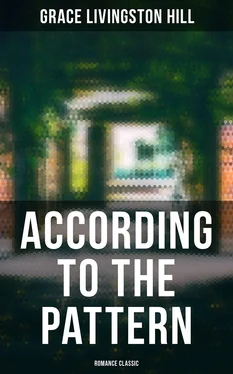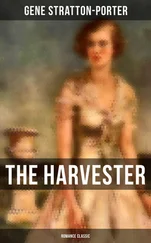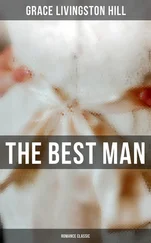And then her conscience, arising from a refreshing sleep, began to take up its neglected work and accused her smartly. It was all her fault. She could see her mistakes as clearly now as if they had been roads leading off from the path she ought to have kept. She had allowed her husband to become alienated from herself. She could look back to the spot where she ought to have done something, just what she did not know. She did not even stop to question whether it had been possible in her state of health, and with their small income, which was eaten up so fast in those days by doctor’s bills and little shoes. But all that was past. It could not be lived over. She had been a failure—yes, she, Miriam Hammond Winthrop—who had thought when she married that she would be the most devoted of wives, she had let her husband drift away from her, and had helped on the destruction that was coming surely and swiftly to her little children. Was it too late? Was the past utterly irretrievable? Had he gone too far? Had he lost his love for her entirely? Was her power all gone? She used to be able to bring the lovelight into his eyes. Could she ever do it again?
Suddenly she laid down the little white garment with the needle just as she was beginning to take the next stitch and went to the mirror over the mantel to look at herself.
She turned on all the gas jets and studied her face critically. Yes, she looked older, and there were wrinkles coming here and there. It seemed to her they had come that afternoon. Her eyes looked tired too, but could she not by vigorous attention to herself make her face once more attractive to her husband? If so it was worth doing, if she might save him, even if she died in the attempt. She took both hands and smoothed her forehead, rubbed her cheeks to make them red, and forgot to notice that the tears had burned themselves up, leaving her eyes brighter than usual. She tossed her hair up a little like the handsome woman’s she had seen in the park. It really was more becoming. Why had she not taken the trouble to dress it in the present style? Then she went back to her chair again and took up the work. The buttonholes that she had expected would take several evenings to finish were vanishing before her excited fingers without her knowing it. It was a relief to her to do something; and she put all her energy into it so that her hands began to ache, but she was only conscious of the awful ache in her heart and sewed on.
If there were some one to advise her! Could she do it?
Could she make a stand against the devil and try to save her Eden? Or was it more than one poor shy woman, with all the odds of the gay world against her, could accomplish?
She longed to have her husband come home that she might throw herself at his feet and beg and plead with him for her happiness, to save their home; she longed to accuse him madly, and fling scorching words at him, and watch his face as she told him how she and his baby had seen him that afternoon; and then she longed again to throw her arms about his neck and cry upon his breast as she used to do when they were first married, and any little thing happened that she did not like. How she used to cry over trifles then! How could she, when such a world of sorrow was coming to her so soon?
She was wise enough to know that none of these longings of her heart must be carried into effect if she would win her husband. In his present attitude he would laugh at her fears! She seemed to understand that her anguish would only anger him because he would feel condemned. Her own soul knew that she could not take him back into her heart of hearts until she won him back and he came of his own accord confessing his wrong to her. But would that ever be? He was a good man at heart, she believed. He would not do wrong, not very wrong, not knowingly. Perhaps he had not learned to love any other woman, only to love society, and—to—cease to love her.
If her dear, wise mother were there! But no! She could not tell her. She must never breathe this thing to any living soul if she would hope to do anything! His honor should be hers. She would protect him from even her own condemnation so long as she could. But what to do and how to do it!
Out of the chaos of her mind there presently began to form a plan. Her breath came and went with quick gasps and her heart beat wildly as she looked the daring thing in the face and summoned her courage to meet it.
Could she perhaps meet that woman, that outrageous woman, on her own ground and vanquish her? Could she with only the few poor little stones of her wits and the sling of her love face this woman Goliath of society and challenge her? What! expect that woman, with all her native grace and beauty, her fabulous wealth, and her years of training to give way before her? A crimson spot came out on either cheek, but she swallowed hard with her hot dry throat and set her lips in firm resolve. She could but fail. She would do it.
But how? And with what? It would take money. She could not use her husband’s, at least not much of it, not to win him back. There was a little, a few hundreds, a small legacy her grandmother had left to her. How pitifully small it seemed now! She cast a glance at a fashion magazine that lay upon her table. She had bought it the day before because of a valuable article on how to make over dress skirts to suit the coming season’s style. How satisfied with the sweet monotony of her life had she been then! It came to her with another sharp thrust now! But that magazine said that gowns from five to seven hundred dollars were no longer remarkable things. How she had smiled but the evening before as she read it and curled her lip at the unfortunates whose lives were run into the grooves of folly that could require such extravagance. Now she wished fiercely that she might possess several that cost not merely seven hundred but seven thousand dollars, if only she might outstrip them all and stand at the head for her husband to see.
But this was folly. She had only a little and that little must do! It had been put aside for a rainy day, or to send the children to college in case father failed. Alas! And now father had failed, but not in the way thought possible, and the money must be used to save him and them all from destruction, if indeed it would hold out. How long would it take, and how, how should she go about it?
With sudden energy she caught up the magazine and read. She had gone over it all the day before in her ride from the city where she had been shopping, and had recognized from its tone that it was familiar with a different world from hers. Now with sudden hope she read feverishly, if perchance there might be some help there for her.
Yes, there were suggestions of how to do this and that, how to plan and dress and act in the different functions of society; but of what use were they to her? How was she to begin? She was not in society and how was she to get there? She could not ask her husband. That would spoil it all. She must get there without his help.
If she only had that editor, that woman or whoever it was who answered those questions, for just a few minutes, she could find out if there was any way in which she could creep into that mystic circle where alone her battle could be fought. She had always despised people who wrote to newspapers for advice in their household troubles and now she felt a sudden sympathy for them. Actually it was now her only source of help, at least the only one of which she knew. Her cheeks burned as the suggestion of writing persistently put itself before her. She could hear her husband’s scornful laugh ringing out as he ridiculed the poor fools who wrote to papers for advice, and the presumption that attempted to administer medicine—mental, moral, and physical—to all the troubles of the earth.
But the wife’s heart suddenly overflowed with gratitude toward the paper. It was trying to do good in the world, it was ready to help the helpless. Why should she be ashamed to write? No one would ever know who it was. And she need not consider herself from last night’s view-point. She had come to a terrible strait. Trouble and shame had entered her life. She no longer stood upon the high pinnacle of joy in happy wifehood! Her heart was broken and her idol clay. What should she care for her former ideas of nicety? It was not for her to question the ways or the means. It was for her to snatch at the first straw that presented itself, as any sensible drowning person would do.
Читать дальше












